Enter content here Pelicans Death. The cold chased away the rare birds from Bulgaria, ensconsed the ecologists from 'Green Balkans' after counting up the feathery. Yet, the poacher's raids upon the protected birds become more frequent. The nature protectors in Sofia showed a dead hooded pelican yesterday and called on the poachers not to reach for the rear species. PHOTO Kiril Konstantinov Picture shows Serbian Orthodox Saint Sava church in Belgrade January 17, 2002. Its construction halted by World War Two and again during the turbulent rule of Slobodan Milosevic, one of the world's largest Christian Orthodox churches may finally be nearing completion. REUTERS/Petar Kujundzic TO MATCH FEATURE YUGOSLAVIA-CHURCH No Night Passes Without Shooting In Tetovo. MAKFAX TetovoSporadic shootings of low intensity were reported last night in tetovo region. The armed ethnic-albanian extremists, ensconced in tetovo, the suburb hamlets and the villages abutting sar mountain, keep on with provocative actions.
No night passes in the troubled tetovo region without volleys of automatic weapons fire lasting from minutes to hours. Kumanovo - Last Night. Reality Macedonia - MIA Kumanovo, January 17 (MIA) - The situation in Kumanovo - Lipkovo region is calm without any armed provocations of the Albanian terrorists.
Police sources say shootings from the villages of Vistica, Slupcane, Ropaljce and Cerkezi are registered Wednesday night between 20:00 and 22:30 hours.
Police forces with mixed ethnic composition continue the patrolling in the two villages from the first phase and in three other from the second phase from the plan for return of the police.
Editors note: Reality Team, thinks that it is apsurde what is going on in Tetovo and Kumanovo region. Tetovo is 8 months under cerfiew, and there is shhootings every night. We are sick of this "controlled unstability" and we feel that is unnecessery to waste time, web space, and energy, to tell the world what is going on in Tetovo and Kumanovo - Lipkovo region. So any time, when you open this page, and there are no news and info about this two troubled places - that means that there was shooting. If anything new comes up (like a single night without shooting) we will be more than happy to let you know. Two For Tango, Three For Confidence? Reality Macedonia Report by Irina Gelevska
Skopje-Yesterday, the three spokespersons of NATO, OSCE and EU, Craig Ratcliff, Florine Pasniky and Irena Gjuzelova, had their first press-conference after the holidays.
In meantime, during the last week, the next phase of the General Plan for Return of the Police in the Crisis Regions started and according to today's opinions of the international community it is not as successful as it was expected.
The reasons are the tensions in the last few days before the start of the next phase in 8 villages in Tetovo, Gostivar and Skopje regions, caused by some statements, controversy in the highest levels of the Macedonian government, and few ceremonies. This caused a lot of anger among the local population so they did not allow the police patrols in some of the villages, by setting up road blocks.
In order to avoid future problems, OSCE, NATO and EU, did not make any official requests to the Macedonian Officials, but they want to advise them on what should be done in the field.
Police should take responsibilities in the villages where they have already returned, the politicians should be working more on building mutual confidence, the shootings should stop and Macedonian officials should not expect to much out of the international organizations. EU also expects that the Macedonian Government will adopt the Law for Local Self-government and that the return of the mixed police patrols will soon be finished.
The international community supports the return of the police but not the special units of the police - was said today at the press-conference at "Hotel Continental," in Skopje.
On Friday, NATO secretary General George Robertson and the Chief of OSCE the minister of foreign affairs of Portugal Gaime Da Gama, will visit Macedonia.
Editors note: Praise the Lord people! Someone has finally found a solution for the problem in the crisis regions. It is the one arm man (Hichkog)! It is us, the Macedonians. Yes, let's tell them what to do, forget the disarmed rebels, human rights fighters, it is not them that shoot from the hills, it is the mean and horrible Macedonians, let's bomb the hell out of them!
Im not saying that the Macedonian Government is a saint and that everything that they did is good and right, but we shall not forget why and who started this stupid conflict. Let's not forget who pretended to be disarmed and now threatens again with new spring armed conflict. Let's not forget those people who are still in the parliament building, and still waiting to find out where their missing relatives are, or at least their relatives bodies!
We thank the EU Community that stopped the global nationalistic war here, but we would like to remind them that as a mediator to this situation, they should be making demands and advise on both sides. Maybe they do, maybe they have long and sleepless nights spent in conversation with the Albanian side on the hills, BUT WE NEED TO SEE RESULTS OF THAT IN ORDER TO START BELIEVING IN THE EU's DESIRE TO STOP THIS MADNESS! Mixed Police Patrols Enter Into Tetovo Teke. MIA Tetovo, January 17 (MIA) - The ethnically mixed police patrols besides in Celopek village have entered in all other Tetovo villages included in the Plan on redeployment of the police - Neprosteno, Slatino, Prsovce, Tearce, Dobroste, Odri, Neraste, Cerovo, Merovo, Glogji and Otusiste.
The police teams accompanied by the representatives of OSCE and NATO's mission "Amber Fox" also entered in Tetovo Teke district. Asan Ljuma, the president of Tetovo Municipality's Council was also present during the entrance in Teke.
According to spokesperson of the Coordinate Crisis Management Body Zoran Tanevski the patrolling is carried out without any difficulties.
The police also patrols along Tetovo - Jazince road i.e. along the alternative route leading to Jazince via Zelino and Lesok villages.
The mixed police patrols fulfill their tasks regularly in Kumanovo villages - Nikustak, Vistica and Ropaljce, in Gostivar villages - Cajle, Vrutok, Recane and Zdunje as well in Skopje villages - Orlanci, Ljuboten and Mojanci. In Radusa village there is an ongoing process of confidence building measures.
The police carry out its activities accompanied by the representatives of NATO, OSCE and the European Union to Macedonia. PRIME MINISTER ASKS FOR UNITY DUE TO SERIOUS THREATS TO MACEDONIA'S SECURITY. MIA 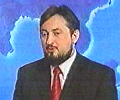
Macedonian Prime Minister Ljubco Georgievski says that the threats on security and integrity of Macedonia are still present and that it is necessary for the state to seriously prepare for eventual repeating of the armed conflicts. In the half-hour interview for Sitel TV, Prime Minister Georgievski emphasises that despite the present war threats in the country, the endangerment can come from abroad, due to the political and the current economic situation of the neighboring areas, where Albanian population is dominant.
In connection to the possible "spring offensive" of the former NLA or the new terrorist formation "ANA", Georgievski stresses that Macedonia's legal obligation is to be ready to defend its security, because "the second battle would be led directly in Skopje, Kumanovo, Tetovo, which could be completely massacred in 2 hours, as well as for the water spring Rasce".
Therefore, according to the Prime Minister, activities for clearing up of terrorist nests should be undertaken in Crna Gora Mountain near Skopje, Sar Mountain, Suva Gora and nearby mountains. Due to the same reasons, now is not the time to withdraw the points of the Macedonian security forces because that will mean that Macedonia enables the terrorists to carry out an ethnic cleansing of Macedonians, Serbs and other nationalities in those areas. 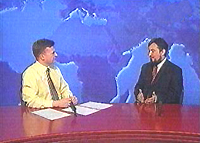
Announcing that there is no unity among the top officials on this issue, Georgievski says that while he is on the position of Prime Minister, he will not break under pressure for withdrawal of the police points. For Georgievski, this disunity is a result of the influence of a part of the international factor in Macedonia, but also the political marketing of individuals and groups, which do not care for Macedonia's security, but for their personal or party marketing. The Prime Minister estimates that return of police in crisis regions is a kind of theatre performance, which cannot be characterized as a successful one.
Referring to speculations on new, large purchases of weaponry, Georgievski says that good training of the members of Macedonian security forces in the last ten months is more important. In that respect, he reminds that at the beginning of the crisis Macedonia had only ten well-trained tank units. Now, the situation is much better, he says. Macedonia does not intend to purchase new quantities of heavy weaponry, the Prime Minister says, but it is certain that the Macedonian army and police must be well-equipped for action in possible, new threats.
Commenting another speculation on possible disbanding of the special unit "Lions", Georgievski says he has no official information on the matter, but it will not surprise him if such demand appears on his table in the next few days. He considers that the issue should not be even discussed, as disbanding of the special forces and dismantling of the police check points will mean disaster and capitulation for the country. PRESIDENT TRAJKOVSKI MEETS WITH LEADERS OF VMRO-DPMNE, SDSM, PDP AND DPA. MIA 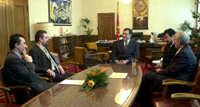
Implementing of the Framework Agreement may proceed as planned, sources from the President's Cabinet said after a meeting Thursday of Macedonian President Boris Trajkovski with the signatories of the Agreement, Ljubco Georgievski, leader of VMRO-DPMNE party, Branko Crvenkovski - leader of SDSM, Imer Imeri - leader of PDP and Arben Xhaferi - DPA leader.
At the meeting, also attended by the European Union special representative to Macedonia, Alain Le Roy, the party leaders said they had political will for quick realization of the Framework Agreement.
President Trajkovski and leaders of the four political parties agreed to hold another meeting at the end of January, focused on defining a timetable of activities for passing or changing of laws in compliance with the Framework Agreement.
In this respect, President Trajkovski will meet with the EU Representative tonight or tomorrow.
By the end of their mandate, the deputies ought to adopt 12 other laws which come from the Framework Agreement, As MIA finds out, only part of the Agreement's regulations will be subject to the Parliament procedure, most probably the ones that Parliament Speaker Stojan Andov listed at a recent press conference.
The issue on early parliamentary elections was also discussed at the today's meeting, but nothing was said about the re-deployment of police patrols in the crisis regions.
The Ministers of Local Government, Health and Education, Faik Arslani, Gjorgi Orovcanec and Nenad Novkovski, along with their experts joined the meeting half an hour after its start, to present their progress in finding solution for the three disputable issues from a draft-law on local government- the issue on joint administration; education and health care. Sources say that solution has almost been reached for the first two issues, while the third one will require additional consultations.
Bruno Gomez, the World Bank expert and Advisor of the Health Minister, presented a new solution of the primary health care issue at the meeting, suggesting for the health care system in Macedonia to be structured in coordination with the country's economic potential.
The proposal would be reviewed and the agreed details should be presented to Trajkovski on Saturday.
"Today we had a very productive meeting with President Trajkovski and with the leaders of the political parties, who agreed all laws to be adopted by the Parliament during the next week," EU special envoy for Macedonia Alain Le Roy said after the meeting with president Trajkovski and the leaders of VMRO-DPMNE, SDSM, DPA and PDP parties.
Le Roy said that the four party leaders - signers of the Framework Agreement were close to reaching agreement, and announced the next meeting for Saturday.
"I hope that this will be the last meeting," he said, adding that the forthcoming elections were not discussed at the meeting held on Thursday.
Minister of Local Self Government Faik Aslani, who together with the ministers of Education - Nenad Novkovski and Health - Gjorgji Orovcanec was also present at the meeting, said that agreement was reached on all three disputable issues, i.e. on the Law for local self-government, for joint administration and for the education.
Aslani said that the issues regarding the health would be reviewed by experts' team on Saturday.
"If everything is agreed on Saturday, the Ministry of Local Self-government will only have to transfer these amendments to the government, which will review them at the Tuesday session," he said. SESSION OF FOREIGN POLICY COMMITTEE. MIA 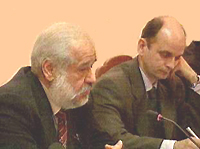
Macedonian Foreign Minister Slobodan Casule addressed Thursday the members of the Assembly's Committee on foreign policy, stressing the necessity of cooperation between the deputies and the Ministry in order to present appropriately the Macedonian strategy before the international community. Casule also announced the "new proactive Macedonian position in the world."
According to Casule the cooperation should be a ground for restoring Macedonia's previous positions with the efforts of all deputies and representatives of the Ministry. "This will provide foreign and interior political stability of Macedonia," Casule said.
He announced that the conclusions of the Ambassador's meeting that was held at the end of 2001, as well as the directions for their platform would be submitted to the members of the Committee very soon.
According to him, "the basic task" of the Ministry in this period is to consolidate the country and to present it before the world as a country that succeeded to recover politically and that is not "any longer a patient on the Balkans and on the international scene."
"We should present Macedonia as a country that has solutions for its problems, and our reintegration in the world will be based on our experience, which made as richer despite all unhappiness and traumas, and we can be part of the global project for eliminating the organized crime and terrorism," Casule stressed.
"The crisis in Macedonia came in the same time with the democratization in Yugoslavia, the local elections on Kosovo and the delineation of the Macedonian - Yugoslav border," Causle said.
"The fact is that we should seek not only support but also partnership. We succeeded to prevent the most terrible thing, although we had many victims and had to make political compromises. But the world appreciates that as great effort and one of the highest achievements of our country," Minister Casule emphasized.
According to Casule now is the time to focus on the "proactive position that should be developed, as the generator of the crisis is still present in this area." "This is not just Macedonian problem and it will not be solved unless we establish equal partnership with our neighbors, the European countries and NATO," he said.
"The generator of the crisis arises from the drugs, weapons and human trafficking, and we should see that the crises on the Balkans are not only a political spilling over from one country to another, but also deliberate creation of crisis regions, that should keep this region on a low level of development in order to prevent the rule of law," Casule said.
According to him, urgent measures are required in order to prevent the creation of new conflict zone, which was forecasted by numerous experts. One of the ideas that he promotes is all neighboring countries of Macedonia to develop joint mechanism for tackling this problem, to increase NATO's activities on Kosovo in the prevention of drugs, weapons and human trafficking in coordination with Macedonia. 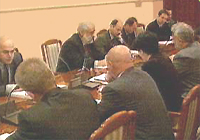
"The experts from the Ministry of Foreign Affairs and I believe that the coordination should be a priority for our country. It will be dangerous if we and the international community remain passive, as the generator of the crisis could launch new extremist platform requesting revision of three countries - Albanian, Yugoslavia and Macedonia," Minister Casule said.
According to him, the message that Macedonia delivers to the world is that the global phenomenon of organized crime and terrorism could penetrate in the united Europe and all its structures, as well as in the regulation on the inviolability of borders. "Therefore, no one should think that the problem and the crisis have been resolved as only the political aspect was removed," Casule said.
"Macedonia knows how, has an experience and sees the generator of the crisis in the region, and therefore we send signals to our neighbors and want to present that aspect of the problem to them. In order to affirm our strategy, we should gain understanding from the world," Minister Casule said in his address to the members of the Foreign Policy Committee.
Referring to the name dispute with Greece Casule said that time had been working for Macedonia, as the US had not met the expectations of Greek Prime Minister Kostas Simitis, considering that this irrational issue should be solved as soon as possible.
"I've told to my Greek counterpart George Papandreou that Greece is very serious economic partner to Macedonia to jeopardize the interests of the biggest Greek companies, such as "Hellenic Petroleum, "OCTA" and several banks, for the name dispute," Casule said.
According to him, losing of such great amount of investments may not harm Greece on long-term bases. However, it will cause great troubles, followed by overthrowing of the Greek Government.
"This irrational problem is also a burden to Greeks, but the further pressure and blackmail on whether Macedonia should be allowed to become part of Europe, would be harmful for them," Casule said.
He underlined that Macedonia's partners throughout the world, such as the US, used the country's constitutional name, while the Macedonian highest authorities should set their future strategy regarding the name dispute.
"Now, I am encouraged by the progress made so far, and by the fact that the world has understood that Macedonia cannot change its Constitution. So, in compliance with all international conventions, the international community cannot refer to the country with a different name," Casule said, adding that for the Greek authorities the name dispute is related to their wisdom.
Referring to the International Crisis Group report, Casule said it was a serious analysis of the overall situation in Macedonia, should not be subordinated only to resolving of the name issue.
Commenting the CIA report, which foresees military and humanitarian catastrophe in Macedonia, Casule said it was an old document and should be understood as a public discussion on possible crises throughout the world, and not as a position of the US administration and a very significant document. PRESS CONFERENCE WITH SPOKESPERSON OF MACEDONIAN ARMY STAFF. MIA 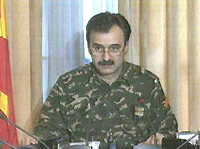
Spokesman of the Macedonian Army Staff, Colonel Blagoja Markovski reported at the press conference Thursday on the meetings realized during the three-day visit to Ukraine by a Macedonian military delegation led by Head of the Army Staff, Lieutenant-General Metodi Stamboliski.
As Markovski said, main purpose of the visit to Ukraine was to provide insight in the future military and technical cooperation between the two countries. In that context, he referred to the meetings realized with Ukrainian Defense Minister Vladimir Petrovic Skedcenko, with Head of the Ukrainian Army Staff Pjotr Ivanovic Suljak and with special representative of the Ukrainian president for the Balkans and deputy minister of foreign affairs Igor Harcenko.
The Macedonian delegation also realized meeting with former defense minister of Ukraine and now military advisor to the president, general Oleksandr Kuzmuk.
Estimating the visit as successful, colonel Markovski said that it came as result of the commitment for more enhanced cooperation between the two countries. AGREEMENT ON RECONSTRUCTION OF BLACE BORDER CROSSING SIGNED. MIA 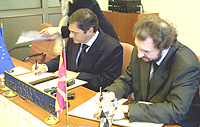
Macedonian Minister of Transport and Communications Ljupco Balkoski, head of the European Commission's delegation to Macedonia Jose Manuel Pinto Teixeira and general manager of construction enterprise "Granit" Straso Milkovski signed an agreement for reconstruction of Blace border crossing.
The European Commission provided 4 million for this project, which aims to alleviate the delays on the Macedonian - Yugoslav border, because of the increased number of vehicles. The construction activities will begin in the next few weeks, and will be completed in eight months.
"The reconstruction of Blace border crossing is one of the priority projects realized through the SEE Stability Pact," Minister Balkovski stressed prior to the signing of the agreement. Macedonia will use the EU assistance through CARDS program, which is replacing FARE program. According to Balkovski, CARDS program includes projects for developing the Macedonian infrastructure i.e. E-75 section and implementation of the project Fund on local developmental projects.
Head of the European Commission's delegation Teixeira pointed out that the reconstruction of Blace border crossing was one of the first projects realized with the urgent program of the Stability Pact.
The project includes construction of parking terminal, customs office for the long vehicles, roads, lightening and other facilities. These facilities will be connected with the similar facilities on Kosovo part of the border, whose construction will be also financed by the European Commission. The parking terminal will provide 25 sites for the long vehicles and 20 sites for cars. The realization of the project will enable more efficient customs administration. The construction activities will be performed by "Granit" enterprise, which was selected through an international tender. REGIONAL SYMPOSIUM ON REGULATIONS IN TELECOMMUNICATIONS BEGINS. MIA 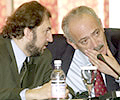
Macedonian Telecommunications Bureau and Southeastern Europe Research Information and Telecommunications Institute (INA) organized Thursday in Skopje the symposium "Independent regulation in Southeastern Europe, obstacles and barriers."
Macedonian Minister of Transport and Communications Ljupco Balkoski opened the symposium.
Pointing out the significance of the telecommunications, Balkoski said that they promote the economic, social and cultural development of all countries in the region and in Europe.
"The successful integration of Macedonia within the European and the regional framework for cooperation and efficient connection with the modern telecommunications infrastructure in compliance with the European standards is a priority for our country," Balkoski said.
He also spoke of the steps made in order to coordinate Macedonia's regulation with the one of the European Union, pointing out the functioning of the Telecommunications Bureau, which was established according to EU recommendations.
"We have achieved noticeable results especially in controlling and regulating the telecommunications, opening of the Control-measurement center and the supply of sophisticated equipment, which enhanced the functioning of this sector," he said. 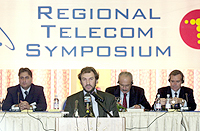
According to Balkoski the achieved results attract the foreign capital, which become obvious through the privatization of the Macedonian Telecom as well as the introduction of the second mobile telephony operator.
"The priority of the Macedonian Government is to enhance the independence of the regulation authorities in this area," Balkoski said, stressing that this was in compliance with the Stabilization and Association Agreement signed with the European Union.
Minister Balkoski expressed his assurance that this symposium will contribute towards expanding and intensifying the cooperation among the SEE countries.
"Let's continue the cooperation in the field of telecommunications in order to establish a ground that will enhance the good neighborly relations, the stability and the security in Southeastern Europe," Minister Balkoski said in his address.
Representatives from the Ministries of transport and communications of Turkey, Greece, Yugoslavia, Albania and Bosnia and Herzegovina will take part at the symposium, which is organized in Macedonia for the first time.
The University professors and the representatives of the mobile telephony operators in these countries will share their experiences in this field and will offer solutions for adjusting the telecommunications' regulation with the one of the EU.
Director of the Telecommunications Bureau Zoran Trajcevski assessed as very significant the opportunity for sharing the experiences among the experts from different countries.
Similar symposia would be held in Istanbul, Thessaloniki and Sofia. Parvanov Takes Oath on Gospel and Cross. Standartnews Silvia Nikolova
For the first time the president of Bulgaria will take oath of office on the Gospel and holy cross, not only the Constitution. Georgi Parvanov will do it on January 19 at a special ceremony in the National Assembly, said Bishop Neophyte from the Holy Synod. Patriarch Maxim and the metropolitans thoroughly read the protocol sent from the President's Office. "Georgi Parvanov was baptized, he is of the Orthodox communion, for this reason we are obliged to put the Gospel and the Cross in front of him", the bishop explained. According to the official protocol the new president does not have to read an excerpt from the Gospel. For the ceremony the church fathers have chosen an exceptionally valuable silver-encased Gospel printed in Istanbul in 1926. Filchev Tightens the Noose around the Neck of Kostov-led Cabinet. Standartnews Frequent meetings of No 1 Prosecutor with Col. Boyko Borissov scared politicians.
Neika Krasteva
Chief Prosecutor Nikola Filchev tightens more and more the noose around the former UDF rulers. One of Ivan Kostov's ministers will have to answer for his deeds. People close to the Commander, cousins and brothers-in-law are incriminated in breaches of law. Filchev's employees have drafted two (for the time being) requests for withdrawal of MPs' immunity. The first one concerns ex-Farm Minister Ventsislav Varbanov. He was involved with the prosecution because of selling out a plot of land (10 ha) in Sofia, in the first place. Later, it turned out that the shady affairs are quite more serious in the Agricultural Fund (Zemedelie). Now it transpired that in the papers concerning this fund evidence against former Finance Minister Mouravey Radev was also found. Logically, indeed. Someone had to give money to Varbanov for the latter to allot them. It was Mouravey who did it. He signed the additional 17.5 million levs to be given to the fund, which violates the State Budget Act. Incriminating data against the ex-Finance Minister of the Kostov-led government were found in line with the Balkan Airlines case. Yordan Sokolov's son-in-law and former Deputy Minister of Economy Hristo Mihailovsky is investigated because of the draining if Bulgartabak. Filchev was after the gang of the UDF rulers as early as they were in power. A year before Kostov's cabinet stepped down, Gen. Atanas Atanassov, head of the National Security Service, was inquired by the prosecutors. Chairman of the Economy Committee of the former parliament Nikola Nikolov also was forced to give explanations about the privatization processes. Two more UDF ministers of Health - Petar Boyadzhiev and Ilko Semerdzhiev - are investigated. Nadezhda Mihailova's husband Kamen was also inquired, as well as ex-minister Wilhelm Kraus in line with the privatization of the former garage of the BCP Central Committee in Sofia. Ex-Interior Minister Emmanuil Yordanov is to give explanations on the 300 Opels bought for the ministry. Evidently, only the ministers fired by Kostov - Bogomil Bonev and Evgenii Bakardzhiev - were doing what they ought to. And were fired for this reason. Filchev will not give up. And the indigenous politicians are not very happy with this prospect. They are on their guard because of the frequent meetings of the Chief Prosecutor and the IM Chief Secretary. It is for sure, that working together, the two institutions will come out with decent bills of indictment and the court will rule verdicts of guilty. The Chief Prosecutor's mandate will not expire soon. Filchev has no intention to resign. The materials aimed to discredit him, failed. "I'm concerned over the scales of criminality," was his curt answer to the attacks. And he tightened the noose around the Kostov's cabinet. Maybe, it is for this reason that someone is making attempts to deliver a blow to the Chief Prosecutor.
(ML) Shouleva: 20,000 Employed in 6 months. Standartnews Parvoleta Tsvetkova
Our government managed to decrease the number of jobless people in the country by 20,000, said yesterday in Montana Minister of Labor and Social Policy, Lidia Shouleva. From last July to date 100,218 new jobs have been created in Bulgaria. The newly employed are by 77,927 more than those who were laid off. According to her, currently the jobless rate in the country is 17 % and is decreasing. Just a day ago, however, the employment agency reported a 0.14-percent rise in unemployment in December. Another 5,284 Bulgarians were left without sustenance. Some time ago, chief of the PM's cabinet, Stoyan Ganev, declared that unemployment rate in Bulgaria runs at 48 percent. Simeon Invites 400 Founders of NMS Party. Standartnews PM calms down the scandal between the MPs and Panayotov.
Elena Yaneva
Nadelina Aneva
Simeon Saxe-Coburg-Gotha will personally invite 400 of the founders of the NMS party. Except for the invited by the PM all the MPs and the ministers, who number 150 people, will take part in the forum. During the sitting which lasted four hours a big scandal burst out in connection with the constituent conference. Emil Koshlukov accused chief of the group Plamen Panayotov of the chaos and the secret appointment of the forum. 'Not that I don't demand the resignation of Panayotov, but the problems won't be solved like that', Koshlukov said. Simeon in person engaged himself to calm down the scandal. Yesterday he called chief of the PG Plamen Panayotov and his deputy. During the conversation he confirmed that he'll head the NMS party.
(PY) Draganova and Peikov Welcomed into Coalition. Standartnews Immediately after the NMS is registered as a party, it will conclude a trilateral coalition agreement with the Party of the Bulgarian Women, headed by Vessela Draganova, and the "Oborishte" movement of Tosho Peikov, said sources close to the Premier. Simeon will become the leader of the new coalition. This is the way to prevent the split within the parliamentary group of the NMS and make the mandate of the ruling majority legitimate. Taushanov Is About to Set BG and Austria at Odds. Standartnews Ivan Taushanov - chairman of the State Telecommunications Commission is about to provoke a grandiose diplomatic scandal with Austria. He's trying to impede large-scale Austrian investors. These are Management trust Holding, the family fund of the prominent politician and businessman Dr. Josef Taus - 'Kordt und Partner', the third-ranking bank in Austria, Bavak-PSK and the family trust of respectable businessman, Martin Schlaff, MC - Privat Stiftung. For no apparent reason the STC referred the matter to itself and is ready to discuss today whether to approve the transfer of shares to the mobile operator. But that is neither necessary nor anyone in the world practises it. The whole world learnt from Reuters and other media about the Austrian investment in Bulgaria and acclaimed it. Yet, yesterday Taushanov's employees tried to imply that they could postpone something. But it's not clear what. Actually, that's exactly 'Taushanov's style. The man is a champion when it comes to gaffes. The commission he chairs was about to sell the BTC dirt cheap two years ago and only active involvement of Brussels stopped the lawless act. The same commission created a scandal with Sweden when in a dim procedure refused to licence 'Media Broadcasting Service' as second private national TV. The same commission put in an embarrassing situation the Cabinet of Saxe-Coburg-Gotha at the sale of the BTC now. Because for the sake of high tariffs it came out that the BTC couldn't apply for the third licence for GSM. Behind the back of many important ministers Taushanov carried new tariffs, which don't exist anywhere in Europe. Taushanov was just the errand-boy of Kostov. A mere puppet. But Taushanov's time expires. Within a month, the head of the newly set up Regulatory Telecommunications Commission, to replace the now existing State Telecommunications Commission, will be known. This is why Taushanov is trying for the last time to let the government down by fooling around the investors. Those same investors, whom Vice-PM Nikolay Vassilev termed as the biggest ones in Bulgaria. One thing is still not clear: why, at the end of his career, Taushanov is so ardent to fall in for the prosecutor's investigation? Parvanov To Shape up His Team at a Secret Supper with Dogan. Standartnews Elena Yaneva
President-elect Georgi Parvanov and MRF leader Ahmed Dogan met at a confidential supper on Tuesday evening, 'Standart' learnt. They discussed the MRF candidacies for the presidential team over a glass of wine. 'We haven't insisted on concrete posts. We offer only candidacies. Georgi Parvanov is the one to decide the preferred figures of them,' Cevdet Chakarov of the MRF leadership commented yesterday. 'Some 4 - 5 offers in average are available for each vacancy. All the appointments will be made by Georgi Parvanov in person,' commented members of the President-elect staff.
(SH) Holy Synod is to Discuss Four Days Pope's Visit. Standartnews starting from forthcoming Tuesday, Bishop Neophyte of Dorostol-Cherven said yesterday. Four days long the bishops will discuss the schedule of John Paul II and decide if they are to invite him to the Rila Monastery. Earlier, his legates delivered his wish to visit the cloister.
(ML) Piece by Piece "Bulgartabac" Costs a Lot. INTERVIEW Standartnews: Koitcho Beltchev The holding should get rid of the unprofitable ventures before it is sold off, says Koitcho Beltchev.
Pavlina Zhivkova 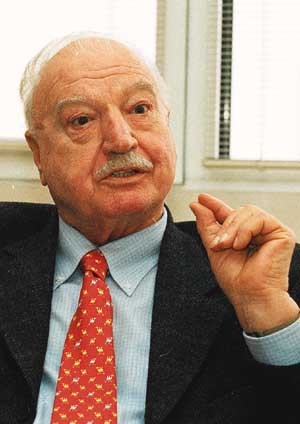
- Mr. Beltchev, you are an expert in tobaccos and cigarettes' manufacture. What is "Bulgartabac" in your opinion? - "Bulgartabac" is a complex structure, which the Bulgarians cannot properly assess at the moment. The holding is a whole empire. It is selling seeds to the producers, buys out raw material, process it in 13 ventures that it owns, manufactures auxiliary materials and cigarettes in 9 factories and sells them to the distributors. Apart from it Bulgaria has some 90 brands. In other words, "Bulgartabac" has five units which are supposed to bring profit. But where is it? - What must be done for the successful privatization of the holding? - Before the deal restructuring is needed. It will not take more than 6-8 months. Within this period "Bulgartabac" should eliminate the unprofitable factories in a civilized way, that is to sell them at auctions or shut them. The workers may be trained for other jobs and be employed elsewhere. Bulgaria doesn't need 9 tobacco factories, only two or four would be enough - those in Blagoevgrad, Sofia, Plovdiv and Stara Zagora. These are modern ventures. The others were open to create jobs. If "Bulgartabac" is sold off along with the losing ventures they will sink in the whole holding, will cut down its price. - Why do you think it should be sold out as separate businesses? - Because tobacco industry is a small and closed group. The companies that would like to buy out the holding are about ten, not more. They are well-known and know the Bulgarian tobacco industry in and out. "Galagher" is one of them. The company has recently bought the tobacco monopoly of Austria, which comprised 3 factories worth $ 2 billion each. Bulgaria is selling nine for $ 100-500 million. Only the difference between these figures is not $ 5 million, but five times. - What would you suggest? - There must be transparency. Bulgaria paid $ 2.5 million to "Kreditanstalt" of Austria and the English "Benson". It seems they paid in an additional $ 1 million. That's what I've heard of, I wouldn't know for sure. I'm prepared to make the assessment together with the Bulgarian experts. - In your opinion, why was the holding's appraisal so low? - Because they are in hurry. You shouldn't forget that in Bulgaria the tobacco business also has social and ethnic aspects. Rumors are running that "Deutsche Bank" wants to buy "Bulgartabac". The sum it is prepared to pay is not known. And what will come next? They will break it up into separate businesses, sell it out piece by piece and reap profit. Why the state cannot do the same? It doesn't need any go-betweens. There are only 8 or 10 candidates, not 100. (Abridged) U.S. fund eyeing more cable TV firms in Bulgaria. Reuters SOFIA, Jan 17 (Reuters) - The Southeast Europe Equity Fund (SEEF), a U.S. fund managed by Soros Private Funds Management, said on Thursday it planned to invest in more cable television companies in Bulgaria as part of ongoing sector consolidation.
The SEEF, set up in 2000 by the U.S. government's Overseas Private Investment Corporation, is a $150 million private fund that makes equity investments in private or privatising companies in the Balkan region.
In November it bought a majority stake in Bulgaria's cable TV company Eurocom Cable and committed to investing $10 million.
``We are looking to acquire more cable firms in Bulgaria and we are talking nearly to everybody,'' the SEEF's Senior Regional Executive Philippe Rombaut told Reuters by telephone.
``We want to take part in the consolidation of the cable business in Bulgaria and seek to acquire more than one company.''
The SEEF has said it plans to invest over $100 million in the Balkans in 2002, mostly in media and telecommunications.
The fund, which began operations in January 2001, has so far invested $33 million and sealed three deals in the media or telecom sectors.
Apart from Eurocom, the fund has also invested in Digital City Media, a Croatian cable TV firm. In early 2001, the fund, in a consortium led by Hungary's Matav Rt , acquired a 51-percent stake in Macedonia's telecom monopoly MakTel. EBRD set to invest $300 mln in Bulgaria power plants. Reuters SOFIA, Jan 17 (Reuters) - The European Bank for Reconstruction and Development said on Thursday it was set to invest up to $300 million in two power projects in Bulgaria, managed by U.S.-based AES Corp and Entergy Corp.
The projects, signed last year, involve a total of 1.450 billion euro ($1.276 billion) and are seen raising Bulgaria's electricity output and strengthening its role of a leading power exporter in the region.
``EBRD has been mandated to provide financing for both projects. We have been asked to provide between $100 million and $150 million to each of them,'' the bank's Deputy Director for Bulgaria Michael Delia told reporters.
He declined to give more details and added that the EBRD was still analysing its role in the two projects, construction work on which was expected to start this year.
The project between Bulgaria's National Electricity Company (NEC) and AES Corp envisages a 980 million euro investment in a joint venture to build a new, 670-megawatt coal-fired plant at Maritsa East One section. It will replace an old unit under a build-and-operate model.
The plant will be located at the Maritsa East lignite coal mining compelx in southern Bulgaria, which generates 30 percent of Bulgaria's power.
The project between NEC and Entergy envisages a 470 million euro investment in a joint venture to upgrade and operate an 840-megawatt coal-fired plant at Maritsa East Three section.
Apart from EBRD, the U.S-based Overseas Private Investment Corporation and Germany's Kredit fur Wiederaufbau are expected to extend credits for the two projects.
The EBRD also plans to invest in upgrading Bulgaria's power distribution and heating systems as part of its new strategy for the country, which includes potential projects worth over 500 million euro over the next two or three years, Delia said.
The bank will provide a 41 million euro loan to Bulgaria to upgrade and expand its power transmission system this year.
The EBRD will also help the Energy Ministry to develop a programme and hire a consultant for the privatisation of the country's seven power transmission companies, Delia said. The ministry plans to sell them by the end of 2002.
The bank will also provide another 30 million euro loan under a four-year project aimed at modernising four of Bulgaria's most inefficent district heating companies, starting with the one in Sofia later this year.
The heating companies project involves a total of 86 million euro and the remaining 56 million would be extended by the World Bank and other western European donors, Delia said.
($ equals 1.135 euro) President Petar Stoyanov dismissed his representatives in the Foreign Aid Agency. News.bg 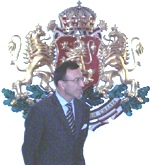
President Petar Stoyanov dismissed his two representatives in the Foreign Aid Agency with edicts No 31 and 31 of today, after the representatives Kin Stoyanov and Radka Markova submitted their resignations. The Foreign Aid Agency Managers Board consisting of seven members (a Chairman, and by 2 members appointed by the President, the Cabinet and the Parliament) does not have specified term. |



